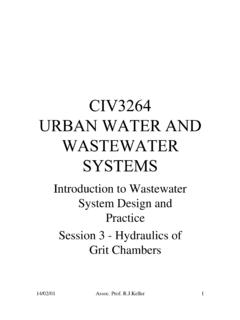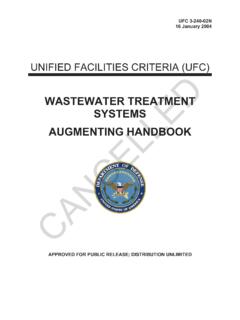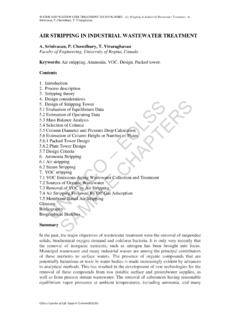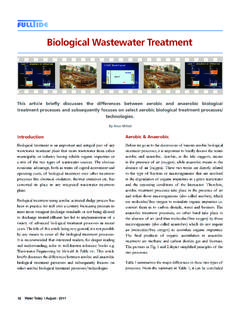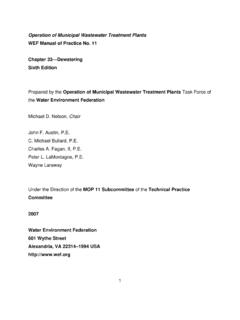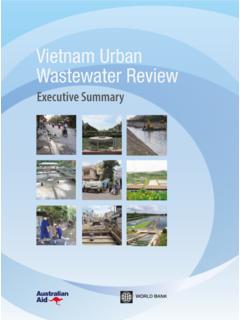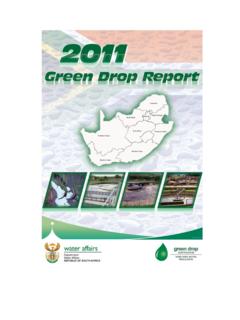Transcription of GPP 4: Treatment and disposal of wastewater where there …
1 November 2017 GPP 4: Treatment and disposal of wastewater where there is no connection to the public foul sewer Guidance for Pollution Prevention (GPPs) are produced by Natural Resources Wales (NRW), the Northern Ireland Environment Agency (NIEA) and the Scottish Environment Protection Agency (SEPA). Contact details are available at the end of the document. GPP 4 provides guidance on environmental best practice. For Northern Ireland, Scotland and Wales, it also provides guidance on your legal environmental obligations. GPP4 is not endorsed by the Environment Agency in England. For official up-to-date guidance on environmental regulations in England, go to or contact the Environment Agency. If you make unauthorised discharges of effluent to the environment, or you cause pollution or allow it to occur, you may be committing a criminal offence.
2 Following these guidelines will help you comply with the law and reduce the chances of a pollution incident. If one does occur, call the Incident/ Pollution Hotline number immediately: in Northern Ireland, Scotland and England 0800 80 70 60, and in Wales 0300 065 3000 (press 1 for 24 hour service). Acknowledgements We thank the following organisations, and the individual contributors within them, for their valued assistance in producing these guidelines. In alphabetical order: British Water Scottish Government (Building Standards Division, Planning and Architectural Division, Flooding and Drainage teams) Scottish Water and Scottish Water Horizons Welsh Government We also thank the valuable assistance of colleagues within our agencies, NIEA, NRW and SEPA, and of NetRegs. 2 GPP4 - Treatment and disposal of wastewater where there is no connection to the public foul sewer Who is this guidance for?
3 This guide is aimed at developers and owners of property - either domestic property or non-domestic property generating domestic-like wastewater - that is not connected to the public foul sewer. It will help you if you are: buying a property or site that has or might have a private wastewater Treatment system , or planning to replace or upgrade your existing private wastewater Treatment system , or starting to plan for the wastewater Treatment needs of a new development. It explains what to have in mind when choosing a wastewater Treatment system for your site, who to contact and your legal obligations. For owners of existing wastewater Treatment systems, it explains what your operation and maintenance obligations are. In this GPP: where the term must is used, this refers to your mandatory, legal obligations under environmental regulations.
4 Words in italics the first time they are used in the GPP, are covered in the Glossary. 3 GPP4 - Treatment and disposal of wastewater where there is no connection to the public foul sewer Contents GPP 4: Treatment and disposal of wastewater where there is no connection to the public foul sewer .. 1 Acknowledgements .. 1 Who is this guidance for? .. 2 1. Introduction how to navigate this guidance .. 4 Checklist A- Your circumstances regarding wastewater Treatment .. 4 Checklist B Choosing the right wastewater Treatment and disposal option .. 5 Flowchart Summary of your Treatment and discharge options .. 6 2. Existing property with private wastewater Treatment system .. 7 If you are buying a property .. 7 If you own a property .. 7 3. Can you connect to the public foul sewer? .. 8 Connecting to the public foul sewer.
5 8 4. Private wastewater Treatment and disposal system - when you cannot connect to the public sewer .. 9 Pre-application advice .. 10 where your system will be installed and where it will discharge to .. 10 Can you discharge to land? .. 10 Can you discharge to surface water? .. 11 When discharging to the environment is not appropriate .. 12 Determining what your wastewater Treatment needs are .. 12 Types of wastewater Treatment systems .. 13 Package sewage Treatment plants (PSTP) .. 13 Septic tanks .. 14 Infiltration systems .. 15 Composting toilets .. 17 Other Treatment systems .. 18 Collection-only systems .. 18 Permissions .. 19 Permission from your environmental regulator .. 19 Planning and building standards/ building controls permissions .. 19 Other permissions .. 20 Designing, and building or installing the system .
6 20 Operation and maintenance of the system .. 21 Correct operation, servicing and preventative maintenance of the system .. 21 Simple checks .. 22 Keeping records .. 24 Replacing your private wastewater system .. 24 5. Glossary .. 24 6. References .. 25 7. Figures references and copyrights .. 30 Appendix A: Percolation Test .. 31 4 GPP4 - Treatment and disposal of wastewater where there is no connection to the public foul sewer 1. Introduction how to navigate this guidance It is illegal to discharge untreated or insufficiently treated wastewater (in glossary) from your site or property to the environment. You must have an appropriate public or private system in place to transport and treat your wastewater (see public foul sewer and private wastewater Treatment system in glossary). Connection to the public foul sewer is the preferred option.
7 Checklists A and B summarise what you need to do and where to go in this GPP. The flowchart summarises the Treatment and disposal options covered in this document. Checklist A- Your circumstances regarding wastewater Treatment Existing properties If you are the owner of property with a private wastewater Treatment and disposal system you are responsible for ensuring this system is appropriate and is maintained properly, whether you have had it installed yourself or bought a property with private wastewater system . Are you planning to buy a property that isn t connected to the public foul sewer? there are a few things to have in mind. See section Do you own property and are not sure what type of sewerage (in glossary) it has? Find out. See section Do you own a property with a private wastewater system ?
8 Keep it in good working order. See section Does your private wastewater system need replacing? Consider connecting to the public foul sewer. See checklist B and section 3. New developments - Property developers are responsible for ensuring that new developments are supplied with appropriate and legally compliant wastewater Treatment systems. See checklist B , and section 3 . 5 GPP4 - Treatment and disposal of wastewater where there is no connection to the public foul sewer Checklist B Choosing the right wastewater Treatment and disposal option For new developments or when replacing an existing private Treatment system : 1. Can you connect to public foul sewer? If that is feasible, get connected. Yes See section 3. No Follow the rest of the checklist. 2.
9 If you cannot connect to public foul sewer: a. where could you install a Treatment system and discharge the treated effluent to? Do you have access to suitable land, watercourse or coastal water? In Northern Ireland, Scotland and Wales, discharging to land is generally favoured. Contact your environmental regulator and your local planning and building standards/ building control authority, for initial advice. See section and section b. What are your wastewater Treatment needs? Assess what composition and volume of wastewater you need to deal with and if the amounts stay the same (steady flow) or vary over time (variable or erratic flow). See section c. Choose the type of wastewater Treatment system that best meets your needs and legal requirements. This depends on what wastewater , amounts and flow you need to treat and where you can discharge the treated effluent to.
10 See section d. Obtain all required legal permissions for your private wastewater system . Do this before you buy or commission any wastewater Treatment system . See section e. Use a competent professional designer or contractor to design and build, or install your system . See section f. Operate your wastewater Treatment system correctly. Inspect and maintain It regularly. See section 6 GPP4 - Treatment and disposal of wastewater where there is no connection to the public foul sewer Flowchart Summary of your wastewater Treatment and discharge options For new developments or when replacing an existing private Treatment and disposal system , in general: 1 Suitability of a land will depend on the geography features and geology/sensitivity of the location, and on the available land s area and percolation value; suitability of a surface water body will depend on dilution.




